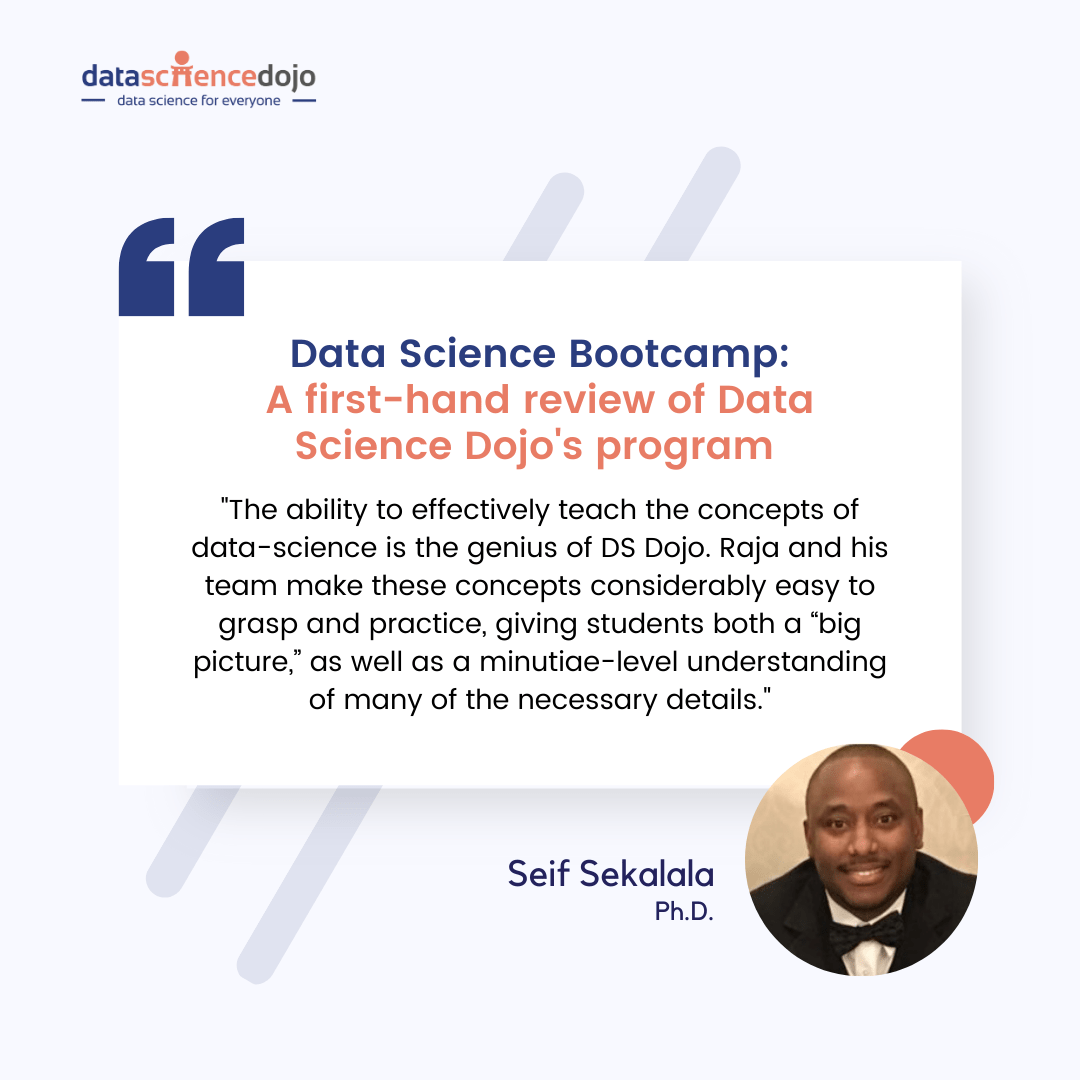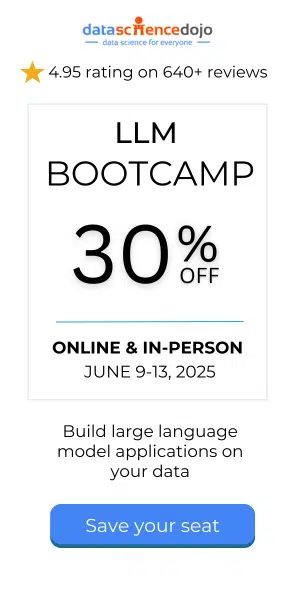Get a behind-the-scenes look at Data Science Dojo’s intensive data science Bootcamp. Learn about the course curriculum, instructor quality, and overall experience in our comprehensive review.
“The more I learn, the more I realize what I don’t know”
(A quote by Raja Iqbal, CEO of DS-Dojo)
In our current era, the terms “AI”, “ML”, “analytics”–etc., are indeed THE “buzzwords” du jour. And yes, these interdisciplinary subjects/topics are **very** important, given our ever-increasing computing capabilities, big-data systems, etc.
The problem, however, is that **very few** folks know how to teach these concepts! But to be fair, teaching in general–even for the easiest subjects–is hard. In any case, **this**–the ability to effectively teach the concepts of data-science–is the genius of DS-Dojo. Raja and his team make these concepts considerably easy to grasp and practice, giving students both a “big picture-,” as well as a minutiae-level understanding of many of the necessary details.
Learn more about the Data Science Bootcamp course offered by Data Science Dojo
Still, a leery prospective student might wonder if the program is worth their time, effort, and financial resources. In the sections below, I attempt to address this concern, elaborating on some of the unique value propositions of DS-Dojo’s pedagogical methods.

The More Things Change…
Data Science enthusiasts today might not realize it, but many of the techniques–in their basic or other forms–have been around for decades. Thus, before diving into the details of data-science processes, students are reminded that long before the terms “big data,” AI/ML, and others became popularized, various industries had all utilized techniques similar to many of today’s data-science models. These include (among others): insurance, search engines, online shopping portals, and social networks.
This exposure helps Data-Science Dojo students consider the numerous creative ways of gathering and using big data from various sources–i.e. directly from human activities or information, or from digital footprints or byproducts of our use of online technologies.
The Big Picture of the Data Science Bootcamp
As for the main curriculum contents, first, DS-Dojo students learn the basics of data exploration, processing/cleaning, and engineering. Students are also taught how to tell stories with data. After all, without predictive or prescriptive–and other–insights, big data is useless.
The bootcamp also stresses the importance of domain knowledge, and relatedly, an awareness of what precise data points should be sought and analyzed. DS-Dojo also trains students to critically assess: why, and how should we classify data. Students also learn the typical data-collection, processing, and analysis pipeline, i.e.:
- Influx
- Collection
- Preprocessing
- Transformation
- Data-mining
- And finally, interpretation and evaluation.
However, any aspiring (good) data scientist should disabuse themselves of the notion that the process doesn’t present challenges. Au contraire, there are numerous challenges; e.g. (among others):
- Scalability
- Dimensionality
- Complex and heterogeneous data
- Data quality
- Data ownership and distribution,
- Privacy,
- Reaction time.
Deep dives
Following the above coverage of the craft’s introductory processes and challenges, DS-Dojo students are then led earnestly into the deeper ends of data-science characteristics and features. For instance, vis-a-vis predictive analytics, how should a data-scientist decide when to use unsupervised learning, versus supervised learning? Among other considerations, practitioners can decide using the criteria listed below.
| Unsupervised Learning…Vs. … >> | << …Vs. …Supervised Learning |
| >> Target values unknown | >> Targets known |
| >> Training data unlabeled | >> Data labeled |
| >> Goal: discover information hidden in the data | >> Goal: Find a way to map attributes to target value(s) |
| >> Clustering | >> Classification and regression |
Read more about the supervised and unsupervised learning
Overall, the main domains covered by DS-Dojo’s data-science bootcamp curriculum are:
- An introduction/overview of the field, including the above-described “big picture,” as well as visualization, and an emphasis on story-telling–or, stated differently, the retrieval of actual/real insights from data;
- Overview of classification processes and tools
- Applications of classification
- Unsupervised learning;
- Regression;
- Special topics–e.g., text-analysis
- And “last but [certainly] not least,” big-data engineering and distribution systems.
Method-/Tool-Abstraction
In addition to the above-described advantageous traits, data-science enthusiasts, aspirants, and practitioners who join this program will be pleasantly surprised with the bootcamp’s de-emphasis on specific tools/approaches. In other words, instead of using doctrinaire approaches that favor only Python, R, Azure, etc., DS-Dojo emphasizes the need for pragmatism; practitioners should embrace the variety of tools at their disposal.
“Whoo-Hoo! Yes, I’m a Data Scientist!”
By the end of the bootcamp, students might be tempted to adopt the above stance–i.e., as stated above (as this section’s title/subheading). But as a proud alumnus of the program, I would cautiously respond: “Maybe!” And if you have indeed mastered the concepts and tools, congratulations!
But strive to remember that the most passionate data science practitioners possess a rather paradoxical trait: humility, and an openness to lifelong learning. As Raja Iqbal, CEO of DS-Dojo pointed out in one of the earlier lectures: The more I learn, the more I realize what I don’t know. Happy data-crunching!
Written by Seif Sekalala






